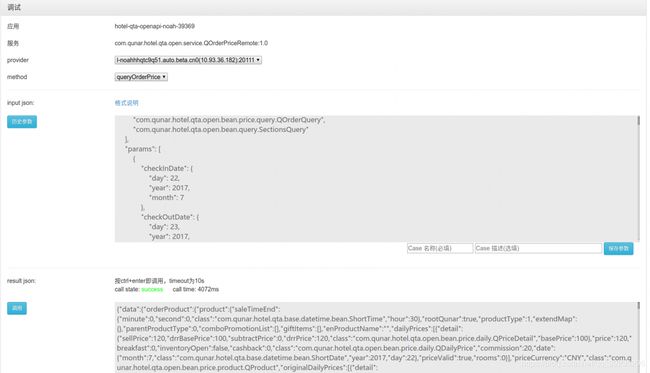dubbo泛化调用原理
泛接口调用方式主要用于客户端没有API接口及模型类元的情况,参数及返回值中的所有POJO均用Map表示,通常用于框架集成,比如:实现一个通用的服务测试框架,可通过GenericService调用所有服务实现。
截图为qunar的dubbo服务测试框架, 只需将参数按照指定的格式填入, 就可以直接调用相应的dubbo接口.

使用
泛化调用需要接口声明为泛化, 可以在声明接口的时候指定,
<dubbo:reference id="barService" interface="com.foo.BarService" generic="true" />
也可以在代码中进行设置:
ReferenceConfig<GenericService> reference = new ReferenceConfig<GenericService>();
reference.setApplication(new ApplicationConfig("generic-consumer"));
reference.setInterface(DemoService.class);
reference.setUrl("dubbo://127.0.0.1:29581?scope=remote");
// 声明为泛化
reference.setGeneric(true);
GenericService genericService = reference.get();
然后就可以使用泛化调用的方式去调用接口了
List<Map<String, Object>> users = new ArrayList<Map<String, Object>>();
Map<String, Object> user = new HashMap<String, Object>();
user.put("class", "com.alibaba.dubbo.config.api.User");
user.put("name", "actual.provider");
users.add(user);
// 泛化调用
users = (List<Map<String, Object>>) genericService.$invoke("getUsers", new String[] {List.class.getName()}, new Object[] {users});
Assert.assertEquals(1, users.size());
Assert.assertEquals("actual.provider", users.get(0).get("name"));
实现
泛化调用是通过dubbo的filter机制实现的, 大概流程如下:
±------------------------------------------+ ±------------------------------------------+| consumer 端 | | provider 端 ||
| | ||
| | ||
| | ||
| | ||
±-----------------+ | | ±-------------+ || |GenericImplFilter | | Invocation |
|GenericFilter | || ±—> |
±------------------------> | | || | ±-----------------+ | | ±-------------+
|| ±----------+ | |
| ±----------+ || | | |
| | | | || |Client |
| | ±-> | Service | || |
| | |
| | || ±----------+ |
| ±------±–+ ||
| | | || ^
±-----------------+ | | ±-------------+ | || | |GenericImplFilter | | |
|GenericFilter | <----------+ || ±------------+
| <-------------------------+ | ||
±-----------------+ | | ±-------------+ || | |
|| | |
|| | |
|| | |
|±------------------------------------------+
±------------------------------------------+
GenericService
GenericService这个接口和java的反射调用非常像, 只需提供调用的方法名称, 参数的类型以及参数的值就可以直接调用对应方法了.
接口的实现如下:
package com.alibaba.dubbo.rpc.service;
/**
* 通用服务接口
*
* @author william.liangf
* @export
*/
public interface GenericService {
/**
* 泛化调用
*
* @param method 方法名,如:findPerson,如果有重载方法,需带上参数列表,如:findPerson(java.lang.String)
* @param parameterTypes 参数类型
* @param args 参数列表
* @return 返回值
* @throws Throwable 方法抛出的异常
*/
Object $invoke(String method, String[] parameterTypes, Object[] args) throws GenericException;
}
PojoUtils
PojoUtils. Travel object deeply, and convert complex type to simple type.
simple type包含primitive type, String, Number(Integer, Long), Date, Array of Primitive type, collection等
举一个简单的例子, java类User定义如下:
public class User {
private int age;
private String name;
private Date birthDay;
private Address address;
public User() {
}
public User(int age, String name, Date birthDay) {
this.age = age;
this.name = name;
this.birthDay = birthDay;
}
public int getAge() {
return age;
}
public String getName() {
return name;
}
public Date getBirthDay() {
return birthDay;
}
public void setAge(int age) {
this.age = age;
}
public void setName(String name) {
this.name = name;
}
public void setBirthDay(Date birthDay) {
this.birthDay = birthDay;
}
将hashmap结构的参数转换成对应的pojo
public Address getAddress() {
return address;
}
public void setAddress(Address address) {
this.address = address;
}
@Override
public String toString() {
return ReflectionToStringBuilder.toString(this);
}
}    

序列化代码:
final Object generalized = PojoUtils.generalize(user);
System.out.println("generalized = " + JSON.toJSONString(generalized));
generalize之后其实是一个hashmap, 写成json字符串之后如下:
{
"birthDay": 1525258281516,
"address": {
"zipCode": 10086,
"street": "haidian street",
"class": "com.air.rmi.dubbo.bean.Address"
},
"name": "Kevin",
"class": "com.air.rmi.dubbo.bean.User",
"age": 26
}
相关filters
GenericFilter: 负责provider端参数的转换.
调用时,将hashmap结构的参数转换成对应的pojo
返回结果时, 将pojo转换成hashmap
// 调用时
args = PojoUtils.realize(args, params, method.getGenericParameterTypes()
// 返回结果时
return new RpcResult(PojoUtils.generalize(result.getValue()));
GenericImplFilter: 负责consumer端参数的转换, 将POJO转换成hashmap结构
Object[] args = PojoUtils.generalize(arguments);
这样consumer端传过来的只是一个map, 并不要有provider端的jar包, 根据这个就可以实现dubbo接口的测试平台.
6.16 泛化引用 · GitBook
Dubbo高级特性实践-泛化调用 – 简书
dubbo高级用法之泛化与接口自适应